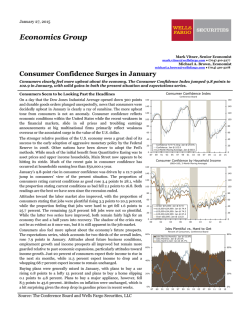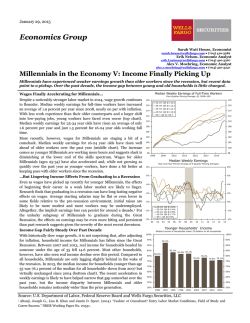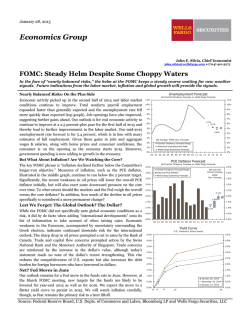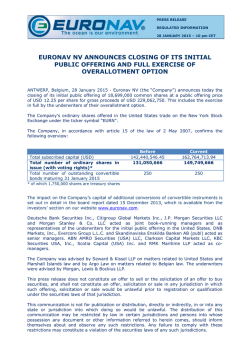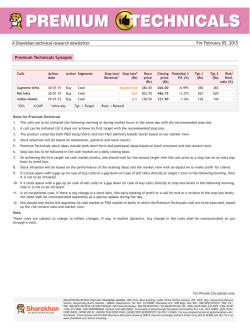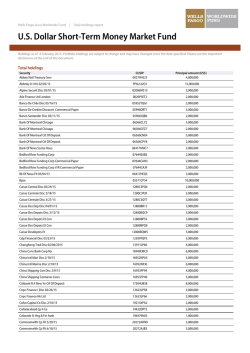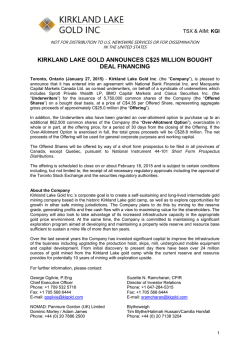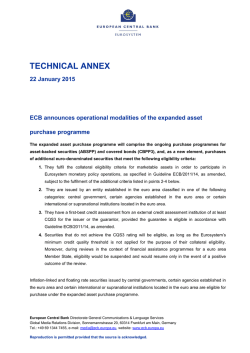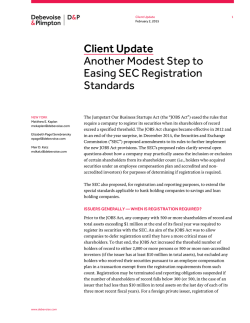
Will Greece Leave the Eurozone? (PDF)
January 30, 2015 Economics Group Special Commentary Jay H. Bryson, Global Economist [email protected] ● (704) 410-3274 Will Greece Leave the Eurozone? Greek voters went to the polls on Sunday and delivered a resounding victory to the far-left Syriza party. Although Syriza came only two seats short of an absolute majority in the 300-seat Greek Parliament, it quickly formed a governing coalition with the far-right Independent Greeks party. What these two seemingly different political parties have in common is their antipathy toward the austerity that Greece has experienced for the past five years or so. Figure 1 Figure 2 Greek Real Level of GDP Greek Government Underlying Primary Balance As Percent of Potential GDP Greek Government Underlying Primary Balance: 2014 @ 7.6% 5% 5% 0% 0% -5% -5% -10% -10% -15% -15% 00 01 02 03 04 05 06 07 08 09 10 11 12 13 14 €70 €70 Real GDP Q3 @ 46.9B €65 €65 €60 €60 €55 €55 €50 €50 €45 €45 €40 €40 98 00 02 04 06 08 10 12 Thousands 10% Thousands Billions of Euros, Not Annualized 10% 14 Source: OECD, IHS Global Insight and Wells Fargo Securities, LLC Figure 1 shows that Greece has indeed endured significant austerity over the past few years. The Greek government has moved its underlying primary fiscal balance, which adjusts for the effects of the economic cycle and which excludes interest payments on debt, from a deficit of 12 percent of GDP in 2009 to a surplus of nearly 8 percent today, a truly herculean effort. Yet, this extraordinary amount of fiscal tightening (i.e., tax increases and spending reductions) has also contributed to the collapse of the Greek economy. Although the economy is slowly starting to grow again, the level of real GDP in Greece is more than 25 percent below its predepression peak at present (Figure 2). The overall rate of unemployment in the Hellenic Republic exceeds 25 percent (Figure 3), but the rate among young people is much higher. So, what happens now? During the campaign, Alexis Tsipras, the leader of Syriza and newlyinstalled prime minister, backed off his earlier vow to repudiate Greek debt. He now wants to work with Greece’s European partners to forgive or restructure some of the debt. Between now and July, the Hellenic Republic must come up with more than €14 billion for principal redemptions on its debt, which the cash-strapped government will struggle to do. Therefore, Greece and its creditors must agree to restructure or forgive some of the country’s debt or the government will face default. In that event, Greece could leave the Eurozone. This report is available on wellsfargo.com/economics and on Bloomberg WFRE. Greece has endured significant austerity over the past few years, contributing to the collapse of their economy. Will Greece Leave the Eurozone? January 30, 2015 WELLS FARGO SECURITIES, LLC ECONOMICS GROUP Figure 3 Figure 4 10-Year Government Bond Yields Greek Unemployment Rate Percent Percent, Seasonally Adjusted 30% 30% 40.0% 40.0% Italy: Jan 30 @ 1.6% Greece: Jan 30 @ 11.0% Spain: Jan 30 @ 1.4% Germany: Jan 30 @ 0.4% Unemployment Rate: Oct @ 25.8% 35.0% 25% 25% 20% 20% 15% 15% 10% 10% 35.0% 30.0% 30.0% 25.0% 25.0% 20.0% 20.0% 15.0% 15.0% 10.0% 10.0% 5.0% 5% 5% 00 European institutions and the IMF would bear the presentvalue losses if Greek debt were restructured. 01 02 03 04 05 06 07 08 09 10 11 12 13 14 5.0% 0.0% 0.0% 03 04 05 06 07 08 09 10 11 12 13 14 15 Source: Bloomberg LP, IHS Global Insight and Wells Fargo Securities, LLC If Greek debt were to be restructured, it would be the second such occurrence in the past three years. The last time that Greek debt was restructured, private-sector investors bore the brunt of the haircuts. With the vast majority of Greek debt now being held by European institutions, other European governments and the IMF, those creditors would bear the present-value losses. Therefore, it will be a game of brinkmanship between the Greek government and its creditors in the coming weeks and months. Would a Greek exit from the Eurozone cause contagion for other euro area countries? As shown in Figure 4, yields on Italian and Spanish government bonds have continued to move lower. If Greece were to leave the Eurozone, the probability of an extreme market dislocation in Europe is lower today, although it is not yet miniscule, than it was three years ago. The €500 billion European Stability Mechanism (ESM) could now be tapped to help countries in financial difficulties, and the ECB has already expressed its willingness to buy sovereign bonds via its quantitative easing program. We expect that European policymakers will find a way to muddle through in the near term. 2 Wells Fargo Securities, LLC Economics Group Diane Schumaker-Krieg Global Head of Research, Economics & Strategy (704) 410-1801 (212) 214-5070 [email protected] John E. Silvia, Ph.D. Chief Economist (704) 410-3275 [email protected] Mark Vitner Senior Economist (704) 410-3277 [email protected] Jay H. Bryson, Ph.D. Global Economist (704) 410-3274 [email protected] Sam Bullard Senior Economist (704) 410-3280 [email protected] Nick Bennenbroek Currency Strategist (212) 214-5636 [email protected] Eugenio J. Alemán, Ph.D. Senior Economist (704) 410-3273 [email protected] Anika R. Khan Senior Economist (704) 410-3271 [email protected] Azhar Iqbal Econometrician (704) 410-3270 [email protected] Tim Quinlan Economist (704) 410-3283 [email protected] Eric Viloria, CFA Currency Strategist (212) 214-5637 [email protected] Sarah Watt House Economist (704) 410-3282 [email protected] Michael A. Brown Economist (704) 410-3278 [email protected] Michael T. Wolf Economist (704) 410-3286 [email protected] Zachary Griffiths Economic Analyst (704) 410-3284 [email protected] Mackenzie Miller Economic Analyst (704) 410-3358 [email protected] Erik Nelson Economic Analyst (704) 410-3267 [email protected] Alex Moehring Economic Analyst (704) 410-3247 [email protected] Donna LaFleur Executive Assistant (704) 410-3279 [email protected] Cyndi Burris Senior Admin. Assistant (704) 410-3272 [email protected] Wells Fargo Securities Economics Group publications are produced by Wells Fargo Securities, LLC, a U.S broker-dealer registered with the U.S. Securities and Exchange Commission, the Financial Industry Regulatory Authority, and the Securities Investor Protection Corp. Wells Fargo Securities, LLC, distributes these publications directly and through subsidiaries including, but not limited to, Wells Fargo & Company, Wells Fargo Bank N.A., Wells Fargo Advisors, LLC, Wells Fargo Securities International Limited, Wells Fargo Securities Asia Limited and Wells Fargo Securities (Japan) Co. Limited. Wells Fargo Securities, LLC. ("WFS") is registered with the Commodities Futures Trading Commission as a futures commission merchant and is a member in good standing of the National Futures Association. Wells Fargo Bank, N.A. ("WFBNA") is registered with the Commodities Futures Trading Commission as a swap dealer and is a member in good standing of the National Futures Association. WFS and WFBNA are generally engaged in the trading of futures and derivative products, any of which may be discussed within this publication. Wells Fargo Securities, LLC does not compensate its research analysts based on specific investment banking transactions. Wells Fargo Securities, LLC’s research analysts receive compensation that is based upon and impacted by the overall profitability and revenue of the firm which includes, but is not limited to investment banking revenue. The information and opinions herein are for general information use only. Wells Fargo Securities, LLC does not guarantee their accuracy or completeness, nor does Wells Fargo Securities, LLC assume any liability for any loss that may result from the reliance by any person upon any such information or opinions. Such information and opinions are subject to change without notice, are for general information only and are not intended as an offer or solicitation with respect to the purchase or sales of any security or as personalized investment advice. Wells Fargo Securities, LLC is a separate legal entity and distinct from affiliated banks and is a wholly owned subsidiary of Wells Fargo & Company © 2015 Wells Fargo Securities, LLC. Important Information for Non-U.S. Recipients For recipients in the EEA, this report is distributed by Wells Fargo Securities International Limited ("WFSIL"). WFSIL is a U.K. incorporated investment firm authorized and regulated by the Financial Conduct Authority. The content of this report has been approved by WFSIL a regulated person under the Act. For purposes of the U.K. Financial Conduct Authority’s rules, this report constitutes impartial investment research. WFSIL does not deal with retail clients as defined in the Markets in Financial Instruments Directive 2007. The FCA rules made under the Financial Services and Markets Act 2000 for the protection of retail clients will therefore not apply, nor will the Financial Services Compensation Scheme be available. This report is not intended for, and should not be relied upon by, retail clients. This document and any other materials accompanying this document (collectively, the "Materials") are provided for general informational purposes only. SECURITIES: NOT FDIC-INSURED/NOT BANK-GUARANTEED/MAY LOSE VALUE
© Copyright 2026
